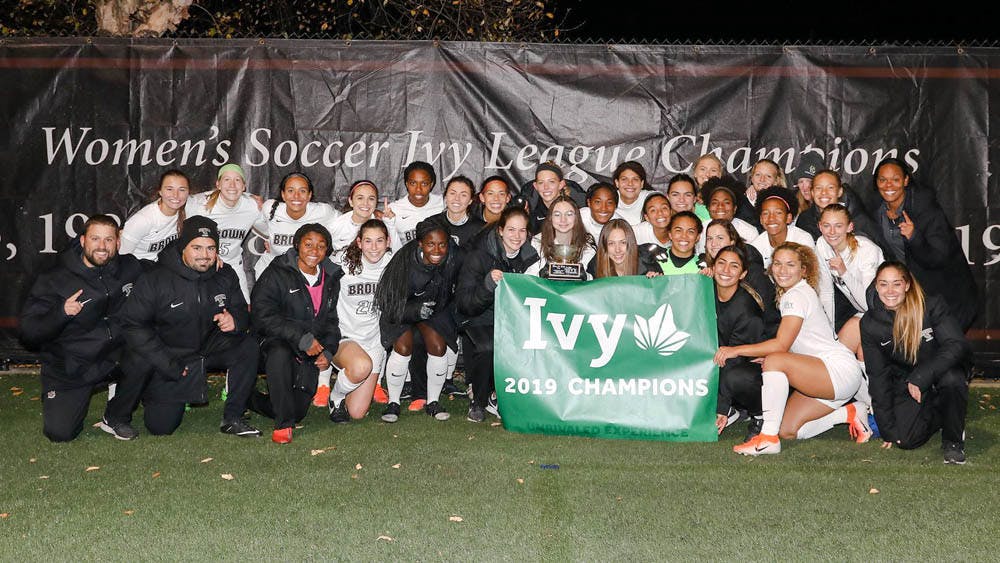The success of the women’s soccer team is no secret. This past season alone, the Bears won the highly coveted title of Ivy League Champions and advanced to the second round of the NCAA tournament. Head Coach Kia McNeill won the conference’s Coach of the Year award, four players earned First Team All-Ivy honors and the team garnered a host of other regional and national recognitions.
In the midst of all these accolades, one critical component of Bruno’s stellar performance has been its diversity. At least eight of Brown’s 11 starters during league and postseason play were Black, per game statistics.
In light of Black History Month, McNeill believes it is especially important to honor Black people and Black athletes. “It’s nice that there is a month where Black history is highlighted, appreciated and recognized,” she said. “That’s important, holistically for the University and for the country as well.”
The Bears lead the conference in Black representation at 12 players on a team of 27, according to McNeill and Director of Athletics Jack Hayes. Together, the squad earned a 14-2-3 overall record and went 6-0-1 in the Ivy League, a record for the University. Since having McNeill at the helm, the team has had three top-four finishes in their conference and has added more Black players every season, she said. McNeill is one of four Black female head coaches in Division I women’s soccer. “I sincerely believe that the diversity on our team was a key factor in our success and will continue to be in the future,” said forward Star White ’21.
McNeill has one message for coaches and teams that make excuses for not recruiting Black athletes: “They’re out there. Give them the opportunity. If there’s anything that my team proves, it’s that. It’s not a fact of me being Black and me recruiting Black players. It’s the fact that those players are out there, and they want to go to the Ivy league, and they want (a school) to give them a chance. And particularly for minorities, they need to (know) that the Ivy League is for them. The (Ivies) as predominantly white institutions should not deter them from coming here.”
According to Hayes, over 100 candidates applied to the head coaching position when it opened four years ago, and McNeill stood out because of her experience as an assistant coach at Boston College and Northeastern University. The challenging part of the hiring process was that many assistant coaches don’t come in with head coaching experience, Hayes added.
“When we met with (McNeill), we looked for skills applicable to the job,” Hayes said. “(She) had all the credentials (and) was certainly able to share that her experiences as a student, a coach and her involvement at the national level were going to be applicable to coaching and recruiting at Brown. And it has been. It’s been a great hire.”
When McNeill took over the team for the 2016 season, she became the only Black head coach in the league and inherited just one Black player, Jenny Caruso ’19. As a school and program, “you can’t promote diversity yet lack it in major parts of what makes your school so great,” Caruso said. Caruso also expressed that being the only Black athlete on the team was odd considering how many there were across the country ready to compete.
“It was weird, and I straight up (told McNeill) it needed to change, and soon. And she did (it),” Caruso said. “I was so lucky to be a part of and watch a new generation of Brown women’s soccer players.”
McNeill says that the conversation with Caruso bothered her. “At that moment, a lightbulb switched for me. I thought, wow, we do need to be more diverse.”
For McNeill, a critical part of recruiting is targeting players who may not be considering Ivy League schools or may not know about them. “That’s not their fault,” McNeill said. “If they’re ‘A’ and ‘B’ students, and they’re elite-level athletes, I want to be in a conversation with them. That’s what’s given us a wide range of diversity (on) our team, and it’s paid off.” Her goal is to broaden the team’s recruiting scope, negate stereotypes about the Ivy League and find the best athletes.
“We’ve got a very diverse team,” Hayes said. “We would feel good about that no matter where we finished in the league. But by finishing first, more attention (is) inevitable. And when you draw more attention, you can share your story more widely.”
According to McNeill, winning a championship and making an NCAA playoff run has definitely made recruiting easier because a lot of players now reach out to her. “It’s obvious that more Black players are looking for Black coaches because it’s more of them coming to me,” she added.
Kayla Thompson ’21, the team’s goalkeeper, said that she “decided to transfer here (because there’s) a Black female head coach. That’s almost unheard of in the NCAA. I’ve never had (one). The diversity you see is spearheaded by her, and we’re fortunate to have that as a reality.”
Thompson added that the team doesn’t often talk about how many Black players there are because it’s so normal, but “we do mention it to each other when we go to play other Ivy League teams, and we see how white (they) are.” She is proud to be on a team full of people who look like her, but it’s “especially incredible to have women of color be the face of an elite institution.”
“To look up on the sidelines and receive information from (McNeill), somebody who looks like me, definitely goes a long way,” said co-captain Sydney Cummings ’21. “It’s a relationship that’s very fluid and that you can’t mirror. She’s a great role model, and I love having her as a coach. No matter who you are, it’s just something special to look at her and see a potential older version of yourself.”
Cummings said that she’s never had a Black coach in her career and has never played on a team this diverse. “It’s amazing because it showcases a more realistic view of the world and of success,” she said.
One of Cummings’ favorite things about Brown is looking around and seeing others who look like her. “It’s fantastic that when I go to practice, that feeling is still there. That’s something a lot of people lose when they go to soccer practice (across the league).”
McNeill said that she takes “a lot of honor and pride in this position. I’m happy that I can be an example for young women. It is important to see people (like me) in positions like a head coach or some type of authoritative position that players look up to.” McNeill sees herself as a coach, but also as a mentor guiding young women through life.





